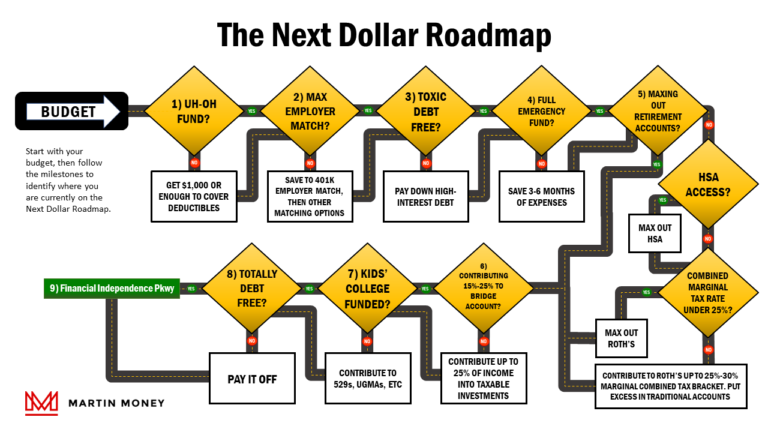How much house can I afford?
After considering factors like location, size, and long-term needs, we recommend carrying a monthly mortgage payment of no more than 25% of your monthly take-home (after tax) pay. This will safely leave room for you to pay for other expenses and save for retirement.
In a previous post, we walked through several steps for evaluating the decision to purchase or rent a home. If you missed that one, be sure to jump back and check it out.
If you’ve already decided to buy a home and simply want to dig into that process a little deeper, this post is for you.
The variety of factors that go into evaluating a home for purchase are numerous. Mostly, you’ll be driven by the three keywords of real estate: location, location, and location.
However, in any given geographic area there may be scores of homes available for sale, each with unique characteristics that will appeal differently to each buyer.
In writing this guide, we want to communicate some of the choices we made, then highlight the payoffs and regrets we saw from those decisions.
Where should I buy a home?
Undoubtedly, this is the primary driver for any housing decision. The closer you can live to your “life” (i.e. work, schools, family, friends, church, etc.) the better your quality of life will be.
Of course, in some cities a matter of a few miles can make hours of difference each week in your spare time.
I have a co-worker who recently moved to Birmingham from the Atlanta area. He said in Atlanta some days his 12-mile commute took more than 90 minutes to complete, one way! On a fast day, it was at least 35 minutes.
The longest average commute in the country? It shouldn’t come as a big surprise that the honor belongs to New York City at 37 minutes.
Not far away, Buffalo, NY boasts the shortest average commute for a major American city at 20.3 minutes.
Comparing the cumulative time cost, you’d save almost 145 hours of your life each year by living in Buffalo instead of NYC. But you’d better enjoy snow.
But, how much is that commuting time really worth?
It can depend greatly on your circumstances. If you have more time available each day, a long commute may simply be an opportunity to kick back and enjoy a good audiobook on the drive or ride home.
If you’re a busy parent and/or spouse, however, you may have difficulty sacrificing even minutes of your day for unproductive matters; commuting included.
In a recent post about income, we talk about the value of calculating what a work hour of your time is worth. This provides at least some idea of the market value of an hour of your time.
Simply take your hourly rate or calculate it by dividing your annual salary by 52 (weeks/year) and then 40 (hours per work week). For example, if your salary is $60,000/year then your hourly rate is $28.45.
In this example, a one-hour commute is worth $28.45 spent working.
Add to that the costs of fuel or fares for public transportation, and you can begin putting together a case for shortening your commute for the benefit of your wallet.
You want your kids in which school?
A primary driver for parents when choosing a home is the status of the school district they want their kids to be educated in.
We moved houses in 2016 specifically for this reason. We even moved into a more expensive, older, smaller home to do it.
Even if you don’t have kids, but plan to, you should have some sort of plan to address this down the road. The further out in front of it you can get, the more flexibility you’re likely to have when those kids reach school age.
For you singles or newlyweds who plan to have kids but think that phase is way down the road, I would encourage you to avoid the naiveté. That day isn’t as far away as it feels.
But how much house can I afford?
We covered location ahead of budget because we assumed that most people have an idea of where they want to live before they decide how much to spend.
But by location, we mean a general area like a city or even a county. The finer details of what community or neighborhood may be driven largely by your budget.
If there’s one specific piece of advice we’d give our younger selves, it would be to set some absolutes in a budget before we start looking at homes.
The reason is by placing some non-negotiable anchors in your purchase plan, it may keep you from moving the goalposts after you see the house with the big yard and the pretty granite countertops.
Without an idea of what you can and can’t afford, you’re more likely to ignore the long-term consequences of assuming a larger mortgage for the sake of trivial characteristics in the home.
Remember, you want to own your home. You don’t want your home to own you.
The first and probably most important guideline we’d give is to cap your mortgage payment at 25% of your take-home pay.
The reason is you need the remainder to do things like eat, pay bills…oh, and save for the future.
If you search the internet for direction on this, you’ll see some recommendations to take out mortgages with payments up to 40% of your monthly income.
This feels like a good time to remind you that many lenders market their services and products through online articles designed to give direction on how much you should borrow.
I feel like also reminding you the more you borrow, the more money they make.
Yes, they have a conflict of interest. A significant one.
Be careful who you listen to for advice on this stuff. Overbuying housing is probably the number one reason most Americans are struggling to save for retirement.
The irony? The competition this creates only drives up the price of houses they can’t really afford.
But some will argue that 40% leaves sufficient room for other expenses.
Let me just say that I have my doubts.
In our rent vs buy post, we already pointed out that the average American currently spends about 38.7% of his or her income on the monthly mortgage.
The same average American’s retirement savings in 2022? $71,500.
This doesn’t exactly sound like a nest egg that would fund any “golden” years to me.
I don’t mean to be snarky, but some people need to hear this. If you want to be average and broke and frustrated, knock yourself out with that 40% mortgage.
If you want to have room to save for a secure future, keep that mortgage payment at or below 25%.
Don’t buy more than you need for the next 4-6 years
Our next recommendation is to only buy as much house as you’ll need for the next 4-6 years.
Also in a previous post, we told you about the first home we bought back in 2005. This is a regret we have regarding that purchase.
It was a 3 bedroom, 2.5 bath house on 0.38 acres. All told, there was 2600+ square feet of finished space and a full basement below.
Did I mention there were only two of us in the house?
For 10 years, we maintained, heated, cooled, and even renovated parts of this house. But we only needed about half of it.
Our oldest was born about 7 years after we purchased the home, so the other bedroom was definitely helpful then. However, we probably would have been better off buying something smaller and upgrading after we were pregnant with the first child.
It’s a small thing I suppose. After all, we could have had a child any time in which case we would have been happy to already have the space, but in hindsight, it wasn’t optimal.
The extra dollars we spent on maintaining and owning square footage we didn’t need could have been saved elsewhere. Mind you, this was in our 20s when savings had the most potential for growth.
Will your income change significantly?
Another factor to bear in mind is how your income may change over the coming years.
For us, this meant going from two incomes to one as Lisa elected to stay at home for a while after our first child was born.
Perhaps you have similar plans or simply know that your income may be altered in the future due to a change in work status or the end of a project.
In any event, factor this into your decision-making as you set your budget.
Back to our example, when Lisa stepped away from work it left us in a bit of a tight spot.
We hadn’t really thought through this fully when we bought the house, so our mortgage payment was suddenly going to become 35% of our take-home pay. (It would have been higher, but this was 7 years later and, thankfully, my income had improved.)
We were fortunate because interest rates had dropped from 5.625% when we originally purchased to 3.25% when we had our first child.
Naturally, we elected to refinance.
We signed up for another 15-year mortgage in 2012 and lowered our monthly payment to just over $1,000/month. This put us back below the 25% guideline and accommodated our desire for Lisa to stay at home.
With all of that said, we were lucky. Had rates still been high, we could have refinanced to save a few bucks each month or sold and downsized. Neither one of those options sounds ideal to me.
You can’t really plan on interest rates falling, so refinancing in the future may not be a good option depending on market forces.
Cheaper to stay put
This may come across as a bit of a contradiction to the previous section, but remember that buying and selling houses is costly.
When you sell, if you elect to use an agent, you will probably pay a seller’s commission of 6% to your real estate agent or it may be split with your buyer’s agent if they have representation.
This, in addition to closing costs which usually run into the thousands of dollars, can run up quite a tab for changing addresses.
In summary, the less often you move, the more favorable the impact will be on your financial health.
If you’re faced with a buying decision and can’t see yourself in that space more than a few years down the road, renting might be for you or you might need to keep looking.
I’d also avoid house shopping if you’re content where you are. Looking at all the bells and whistles you don’t have in your current house can invite malcontent where none existed before.
Do yourself a favor and love the one you’re with. Your wallet will thank you.







